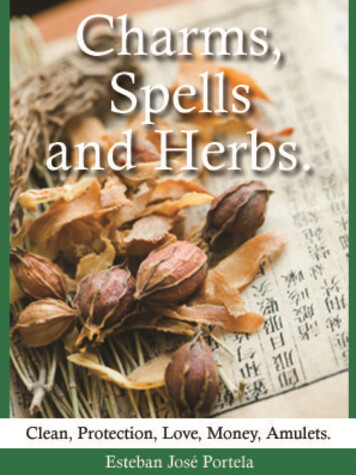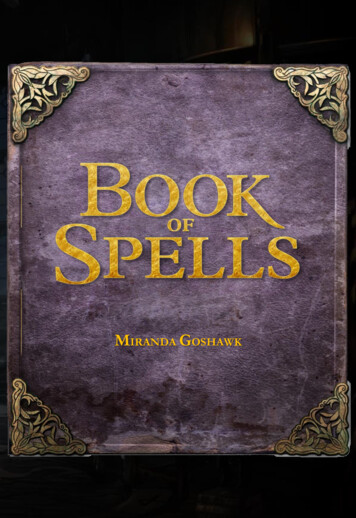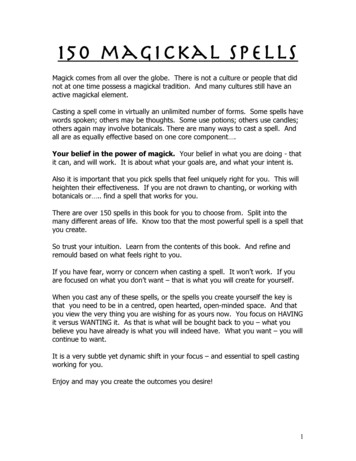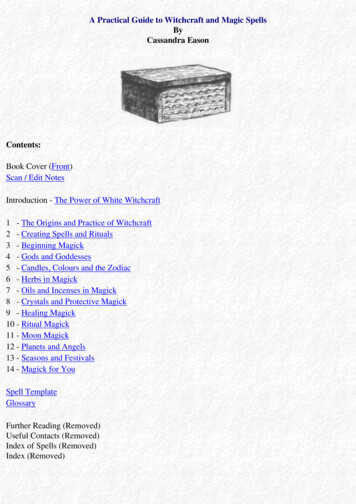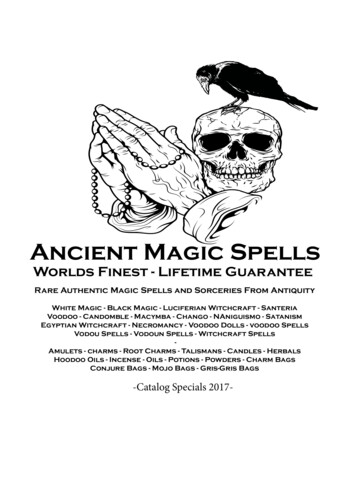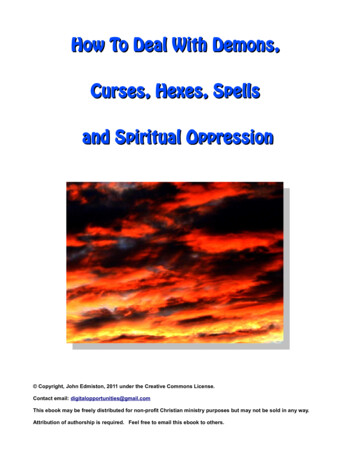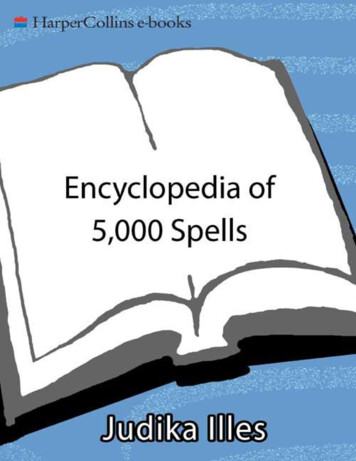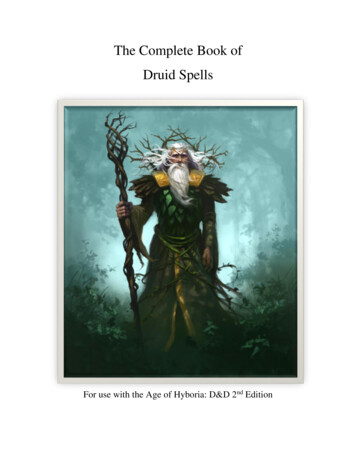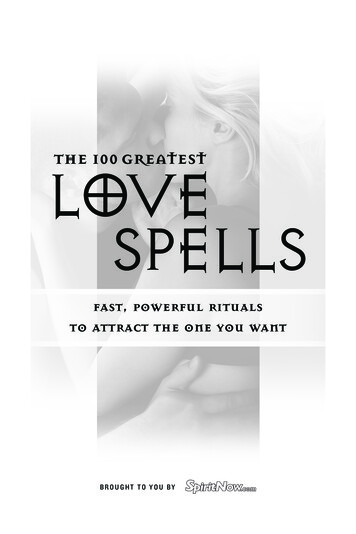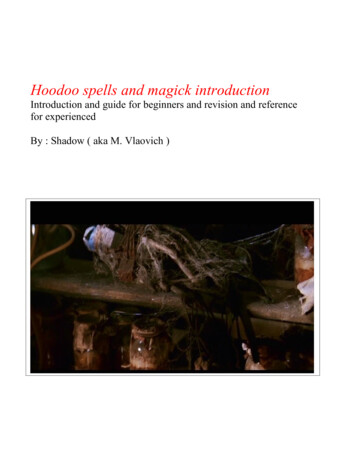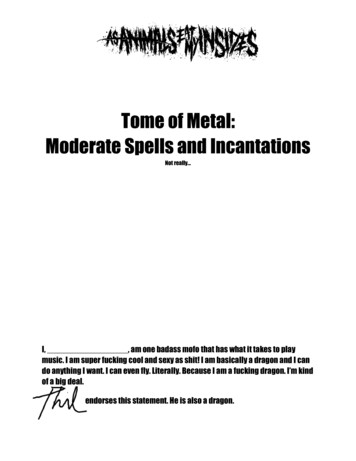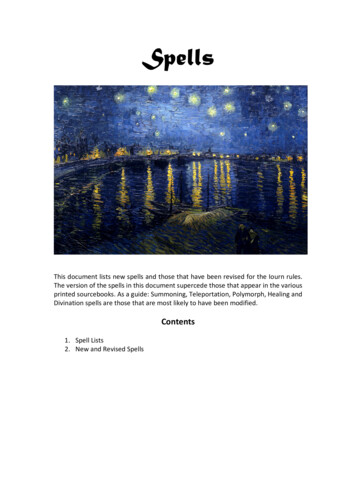
Transcription
SpellsThis document lists new spells and those that have been revised for the Iourn rules.The version of the spells in this document supercede those that appear in the variousprinted sourcebooks. As a guide: Summoning, Teleportation, Polymorph, Healing andDivination spells are those that are most likely to have been modified.Contents1. Spell Lists2. New and Revised Spells
Spell ListsThe following summarises the spell-lists for the all the magic using classes presentedin the Character Classes document. Spells are only drawn from the Pathfinder CoreRules (2009), the Advanced Player's Guide (2010) , Inner Sea World Guide (2011),Ultimate Magic (2011) and this document. All other sources – including the SpellCompendium (2005) – are not permitted, although I will consider individual spells ona case-by-case basis.Work still needs to be done to bring all the spell lists in line with the new magic rules.But as this is a mostly a case of renaming and semantics the game plays perfectlywell without making these changes.Alchemist: Technically an acquired spellcaster, the alchemist must actually preparehis spells in advance because he creates them in the form of an elixir. A class of theArcane tradition, the elixirs are drawn from the Arcane (alchemy) spell list. For themoment use the Alchemist spell list presented in the printed books.Bard: An instinctive caster of the Song tradition. The bard draws spells from the Song(Bardic) spell list. Use the Bard spell list instead.Binder: A spellcaster of the Pact tradition. His access to spells are dependent uponthe vestiges he has bound to his person. Use these lists as presented in the Tome ofMagic.Bladesinger: An acquired spell caster of the Song tradition. The Bladesinger drawsspells from the Song (Bladesinging) spell list. For the moment choose spells from theMagus spell list instead.Cleric: An acquired spell caster of the Divine tradition. The spell list of clerics is verydifferent. Spells are drawn from seven Divine domains. These new rules have beencompleted, see the character class for more information.Druid: An acquired spellcaster of the Primal tradition. The druid draws spells fromthe primal spell-list. For the moment, use the Druid spell list instead.Eidolater: An instinctive spellcaster of the Pact tradition. The eidolater draws spellsfrom the Pact (Eidolatry) spell list. Until that is finished use the Summoner spell-listinstead.Inquisitor: An instinctive caster of the Divine tradition. Inquisitors have access to theInquisitor domain, and three other domains depending on their choice of deity. Seethe class description for more information.
Oracle: An instinctive caster of the Divine tradition. The Oracle gains access to spellsfrom a number of Domains dependent upon her choice of Mystery. See the classdescription for more information.Paladin: An acquired caster of the Divine tradition. The paladin draws spells from thepaladin domain, and three other domains depending on his faith and his calling. Seethe description of the character class for more information.Ranger: An acquired caster of the Primal tradition. The ranger should share theprimal spell list with the druid. Until work on balancing the list is complete use theRanger spelll list instead.Sorcerer: An instinctive caster of the Arcane tradition. The sorcerer draws spellsfrom the Arcane spell list. This is effectively the same as the sorcerer/wizard spell list,so use that instead for the moment.Witch: An acquired caster of the Pact tradition. Witch's should draw spells from thePact (witchery) spell list. Until that list is complete, use the Witch spell list instead.Wizard: An acquired caster of the Arcane tradition. Wizards should use the Arcanespell list, but they can use the sorcerer/wizard list of the time being instead.
New and Revised SpellsAnalyse DweomerDivinationLevel: Arcane 6, Divine (Magic) 6, Song 6Casting Time: 8 hoursRange: Short (25 ft. 5 ft./2 levels)Targets: One object per caster levelDuration: InstantaneousSaving Throw: None or Will negates (see text)Spell Resistance: NoCasting this spell requires eight hours, and access to a magical laboratory orsimilar space dedicated to the study and research of magic. The ritual requires theuse of magical paraphenalia such as lenses, dyes and reagents commonly found inmagical or alchemical laboratories. Analyse dweomer is used to determine thespecific magical properties of magical items, and the caster may examine anumber of such items equal to his level with one casting of this spell.After eight hours has passed, the caster learns the following about each magicitem: its functions (including any curse effects), how to activate its functions (ifappropriate), and how many charges are left (if it uses charges). Intelligent itemsmay attempt a Will save to resist the casting of this spell. If the save succeeds, youlearn nothing about the object except what you can discern by looking at it. Anobject that makes its save cannot be affected by any other analyse dweomerspells for 24 hours.Analyse dweomer does not function when used on an artefact.Bless ElementTransmutation [Air, Earth, Fire, Necrotic, Radiant or Water]Level: Divine (Air, Death, Earth, Fire, Life, Water) 1Components: Sufficient quantity of the element in question to blessCasting Time: 1 minuteRange: TouchTarget: 1 pint (or equivalent) of pure elementDuration: InstantaneousSaving Throw: Will Negates (object)Spell Resistance: NoElemental priests and worshippers of the Moon Gods can imbue divine powerinto a small quantity of their patron element. Because of the godly energy thatruns through it, the element provokes a powerful reaction in undead creatures.
Holy elements retain their purity and blessed state until they are used. Somepriests carry the element around with them as a sign of their faith; others usethem as components in complicated spells. In areas rife with the undead, priestsregularly bless elements and hand them out for free to their congregations.Undead creatures cannot physically cross a line made from a blessed element,although they can go around it and use any ranged, close or far abilities toinfluence or attack the other side of the line. Intelligent undead are likely to beable to find numerous other ways to get across. A single casting of this spell canbless approximately one foot of the element. So it would take twenty castings forone cleric to bless a ring of (e.g.) holy earth with a 20 ft. circumference.If a holy element is thrown at an undead creature (including an incorporealundead), that creature takes 2d4 points of damage. Any other undead creatureswithin five feet take 1d4 splash damage from the attack. If the undead creaturehas regeneration of any sort, the damage from the holy elemental counts as lethaldamage and cannot be regenerated.An attack with a holy element is a ranged attack roll, and requires a standardaction.If an undead creature is completely immersed in a blessed element then it takes10d4 damage each round until it can extricate itself.The element produced, and the descriptor of the spell, depends on the nature ofthe priest's faith. For example, access to the Fire domain would give the spell theFire descriptor, and allow the cleric to bless fire. It would not allow the cleric tobless any of the other elements.The nature of the spell depends on which of the six elements are blessed. Asfollows:Air: The cleric summons pure, natural air from the world around him andconcentrates it in the palm of his hand, or holy altar. As he chants the air spinsfaster and faster taking the form of a miniature cyclone. Once blessed the air canbe bottled in small fragile flasks for later use. Blessed Air inflicts an additional 2d4 damage against incorporeal undead.Death: Necrotic energy is usually beneficial to the undead, but it becomes apotent weapon when blessed with a god's energy. The cleric usually draws thenecrotic energy from a source of death, such as a diseased individual or a deadbody. The energy takes the form of a fetid black soup, that will damage living flesh(1d4 damage if you touch it). The necrotic energy is held in a container. The clericplaces his hand in the necrotic energy at the moment of casting, transforming itinto a blessed element and does not take any damage. Blessed Death inflicts anadditional 2d4 damage against mindless undead such as skeletons and zombies.
Earth: Good soil or small stones can be used as the material component to createblessed earth. It is important that the earth has come from a natural environmentand not been worked by the hand of civilisation. The resulting blessed earth takesthe form of a rich brown/red powder than can be bottled or stored in a pouch.Blessed earth inflicts an additional 2d4 damage against corporeal undeadcreatures.Fire: The cleric kindles a fire from natural elements such as wood, or conjures itwith related magics. At the end of casting the cleric plunges his hand into the fire,and picks up the living flame. The fire does no damage to the cleric, but will stillburn other creatures (1d4 fire damage). The fire can then be bottled. The bottleholding the blessed fire sheds dim light in a 10 ft. radius. Blessed fire inflicts 1d4fire damage against all creatures, in addition to the 2d4 damage it does to theundead. Undead vulnerable to fire may take more damage from the attack.Life: The essence of life energy takes the form of a luminous spark of intensewhite light. This radiant energy can be gained by magical means, or slowly drawnfrom the cleric himself as part of the casting of the spell. Once imbued with divinepower blessed life can be bottled until it is needed. The damage inflicted byblessed life is considered radiant, so it therefore acts against an undead'screature's vulnerablility to radiant damage in addition to the 2d4 damage ablessed element would normally inflict.Water: The water used in this spell must be pure and free from disease. It is heldin a vessel while the cleric chants over it. One pint of blessed water is produced,which can he held in a stoppered flask. If consumed, blessed water is no morerefreshing than normal water. Blessed water inflicts an addiitonal 2d4 damageagainst ensouled undead such as vampires, liches and death knights.BreezeEvocationLevel: Arcane 0, Divine (Air) 0Casting Time: 1 standard actionRange: Short (25 ft. 5 ft./2 levels)Targets: One creature or objectDuration: 1 hour (D)Saving Throw: Will negates (harmless)Spell Resistance: YesYou create a light wind that blows against the target, from a direction of yourchoice. The breeze grants the subject a 2 bonus on saves against very hotconditions, severe heat, breath weapons, and saves against cloud vapors andgases (such as cloudkill, stinking cloud, and inhaled poisons). This spell does notfunction without air or underwater.
You can only have one breeze active at any one time. If you cast this spell whileanother casting is still in effect, the previous casting is dispelled.CommuneDivinationLevel: Divine (All, Inquisitor) 5Casting Time: 1 hourRange: PersonalTarget: YouDuration: 1 round/levelSpell Resistance: NoYou contact the extraplanar agents of your deity, and may ask questions of them.A divine caster with no particular deity (such as an oracle) appeals to anequivalent entity. You may ask one question per caster level, and the spell endswhen he final question is answered. If you delay, discuss the answers or go offand do something else, the spell also ends.The amount of information gained from a commune spell is entirely dependenton the knowledge of the entity that you invoke. Some may be more helpful thanothers in certain circumstances. For example, if the party wishes to know moreinformation about an uncharacteristic increase in volcanic activity, a communespell cast by a priest of Calafax is more likely to summon a being who knowsuseful information, than if the spell was cast by a cleric of Sharrash.The entity invoked by this spell is played as an NPC by the GM. These beings havetheir own personalities and goals which will colour any answers that the casterreceives. Depending on the questions asked, the entity may be deliberatelyduplicitous or genuinely eager to help. Entities conjured by the commune spell arenot omniscient, and there may be some questions that they simply cannot answer.Contact Other PlaneDivinationLevel: Arcane 5Casting Time: 1 hourRange: PersonalTarget: YouDuration: ConcentrationSpell Resistance: NoYou send your mind to another plane of existence in an attempt to answer aperplexing and unknowable puzzle. The great powers you contact by means ofthis spell resent the intrusion of mortal minds upon their time. At best theanswers they give are terse and to the point. At worse, they deliberately lie and
may feeblemind the spellcaster. No arcane caster attempts to contact other planeon a whim. It is likely the spell of the last resort, when all other avenues ofenquiry prove fruitless.As with a commune spell (q.v.) the caster must have an idea of the entity that heis trying to seek. Arcane casters are not limited in the particular types or locationsof these entities; they simply need to seek out a being that they think has theanswer to their question.The contacted entity is under absolutely no obligation to answer the spellcasterquickly, truthfully or at all. It might demand some service or payment from thespellcaster, which may be as benign or nefarious as the GM deems appropriate. Inaddition to this uncertainty, arcane casters who send their minds into the etherrun a significant chance of not returning with all their faculties. Consider the planethe contacted entity dwells upon, and then refer to the following table:Plane ContactedElemental PlaneAstral PlaneOuter PlaneFar RealmDC to avoid ability scoredecrease9121518Duration of ability scoredecrease1 week2 weeks4 weeks5 weeksPlane Contacted: The elemental planes of Iourn are the planes of Earth, Air, Fire,Water, Life and Death. They are the domains of
The following summarises the spell-lists for the all the magic using classes presented in the Character Classes document. Spells are only drawn from the Pathfinder Core Rules (2009), the Advanced Player's Guide (2010) , Inner Sea World Guide (2011), Ultimate Magic (2011) and this document. All other sources – including the Spell Compendium (2005) – are not permitted, although I will .
